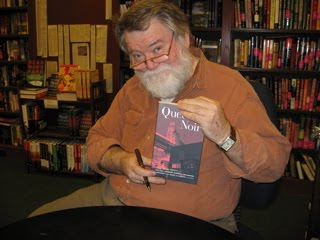Robert Knightly, PSWA member, first book out


Marilyn: Robert Knightly charmed many of us with his understated humor when he came and spoke to us at PSWA about short story writing and many other subjects a few years ago. I've asked him a few pertinent questions so others can learn more about him. Robert, tell us something about your writing.
Robert: First realized my calling while a sophmore in college, so took creative writing course and did college journalism. After the Army, as copyboy on the former New York Journal-American, an afternoon daily, soon to become defunct. Next up, business journalism-- Asst. Editor of 'Maintenance Supplies Magazine', then Editor (briefly) of 'Contract Cleaning Magazine', till I was exposed as uninterested-- then a financial PR firm, even more briefly. Lastly, Writer of catalogue descriptions of electrical fixtures (the final straw).
Fleeing my writing career, I became a cop in the NYPD, and eventually and unavoidably, a reporter on SPRING 3100, the Department Magazine, and speech writer for the Police Commissioner). All of which, of course, led me to writing fiction while a Patrol Sergeant in Greenwich Village where the artsy air seeped into my bones.
Marilyn: I know that you you are well-known for your short stories.
Robert: First short story, 'One More For the Road', in an anthology of original crime stories, 'Brooklyn Noir," in 2004. In 2006, 'Take the Man's Pay' in 'Manhattan Noir' which was later included in 'Best American Mystery Stories 2007'. In 2008, Editor of 'Queens Noir', which, naturally, included my story, 'First Calvary'. In 2009, 'Getting To Know MadDog' in 'Brooklyn Noir 3: Nothing But the Truth'.
Marilyn: I recently read you first novel and liked it very much. Tell my readers about it.
Robert: My first novel, 'Bodies In Winter,' a police procedural, grew out of my first published short story. The idea grabbed and stayed with me and demanded more room: A brutal, violent cop is told he killed a prisoner in an alcoholic blackout; he doesn't remember. Convicted and sentenced to State Prison, years later a memory surfaces that convinces him he's innocent. What happens when he's released, looking to even the score? I knew such a cop in real life: the spark for the story and novel. (See his story in 'Getting to Know MadDog'.)
Marilyn: What's next?
Robert: The sequel is done. 'The Cold Room', with the same detective team, Harry Corbin and Adele Bentibi, pursuing a murderous Checheyn white-slaver through the Boroughs of the City. I'm looking for an agent and U.S. publisher (where the money is)...Although I'm just a short story writer masquerading as a novelist, till the novelty wears thin.
Thanks a bunch, Marilyn! I love the PSWA and its people. Hope to get to a Convention soon as I can
Marilyn: Thank you, Robert, we'd love to see again.
Remember folks, sign up for the PSWA Conference before March 31st for the lower rate and if you want to be on a panel. http://publicsafetywriter.com


Comments
Best wishes with "The Cold Room" and your quest for an agent & U.S. publisher. Both novels sound terrific.